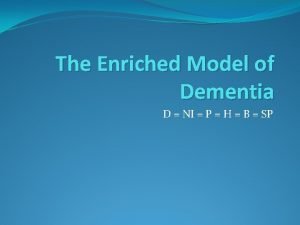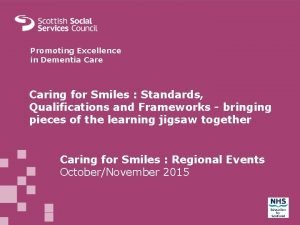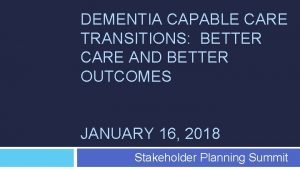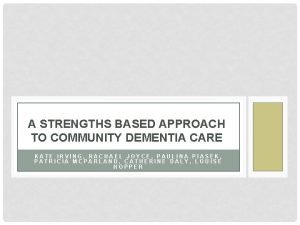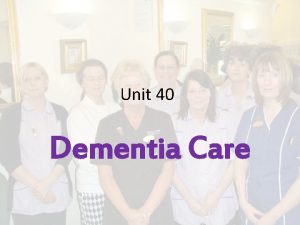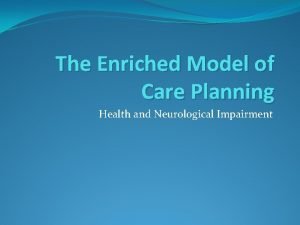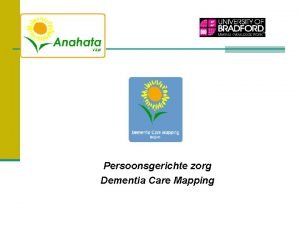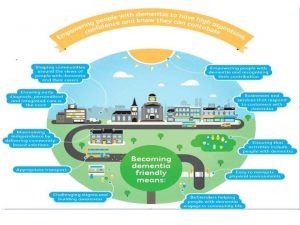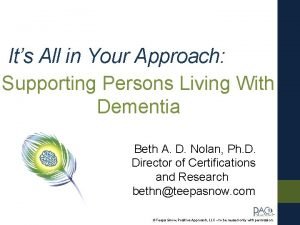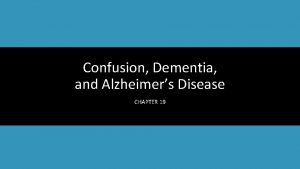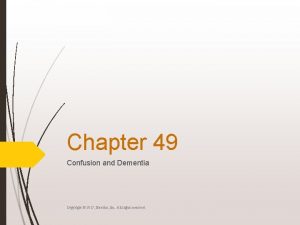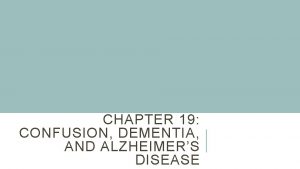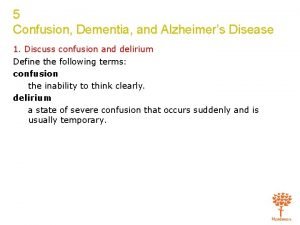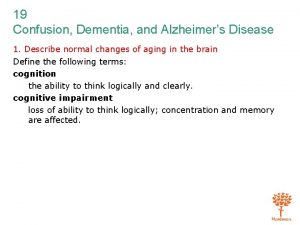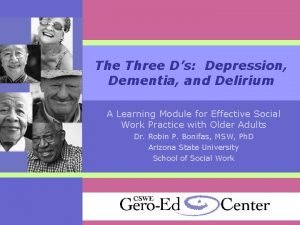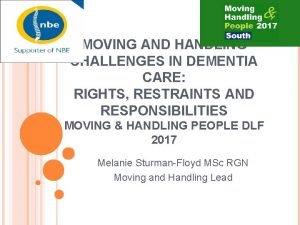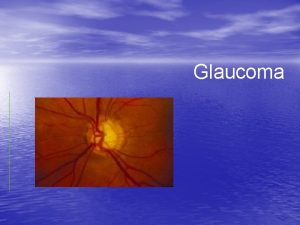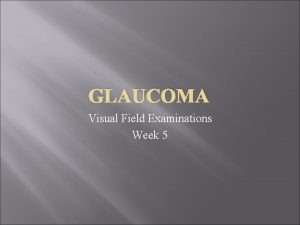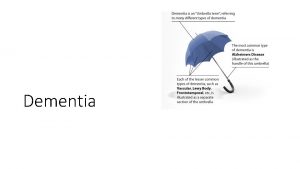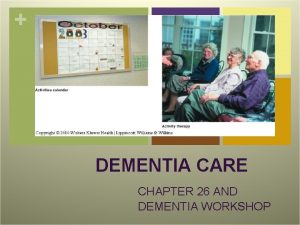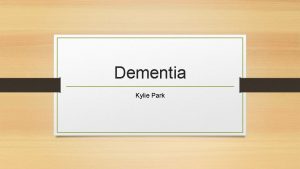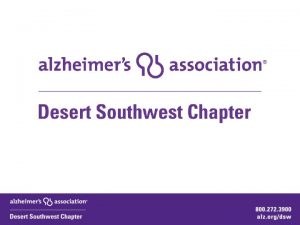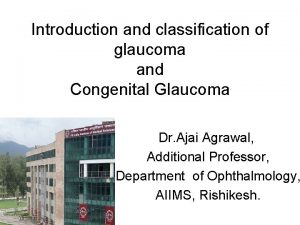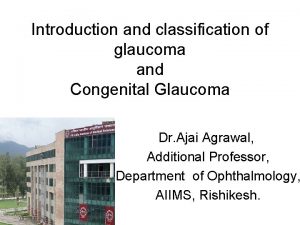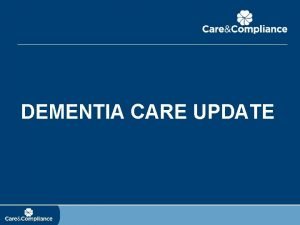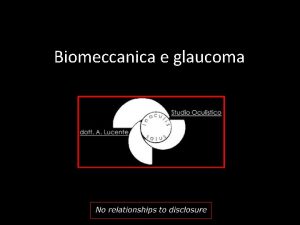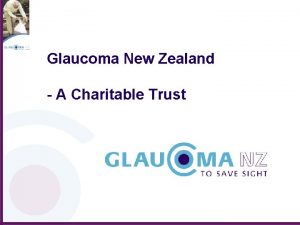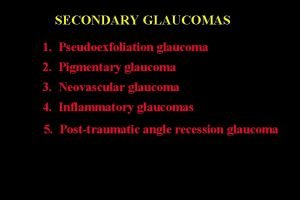Glaucoma Dementia and the Precipice of Care Dr

















- Slides: 17

Glaucoma, Dementia and the Precipice of Care Dr. Simon Read, School of Healthcare Sciences, Cardiff University Prof. Heather Waterman, School of Healthcare Sciences, Cardiff University

The Problem of Glaucoma ▪ Glaucoma refers to a group of conditions affecting a person’s sight ▪ Affects around 2% of people aged over 40; 10% of those aged over 75 ▪ This accounts for 600, 000 people in UK; a further 300, 000 may be undiagnosed ▪ Caused by build-up of pressure in the eye or a weakness in the optic nerve ▪ Initially symptomless - only detected by visit to optician ▪ Treatment generally involves daily eye drops ▪ If not treated medically, glaucoma will progress to loss of vision and blindness

Dementia and Glaucoma ▪ The varying types of dementia are estimated to affect over 850, 000 people in the UK ▪ Both conditions are age-related and affect neurons in the brain ▪ Both conditions expected to increase with ageing population ▪ Symptoms and effects of dementia vary from person to person but can include: ▪ Difficulty in finding the right words ▪ Decline in mental ability and concentration ▪ Shifts in personality and mood ▪ Memory loss and forgetfulness

The Research Problem ▪ World Health Organisation (2003) report emphasised adherence to long-term therapies as a key concern ▪ SCIE: 45 percent of medicines prescribed in the UK for older people; up to 50 percent of that population are believed to not take them as prescribed ▪ How does dementia affect the issue of adherence for glaucoma patients, carers and healthcare professionals? ▪ Population affected by dementia and glaucoma not fully understood ▪ A study in Fife suggested 24% of people now blind through glaucoma also had dementia ▪ Those experiencing both conditions could suffer greater distress and confusion

Our Research Study ▪ Two research sites in Wales and Scotland ▪ Interviewed 23 patients suffering dementia and glaucoma ▪ Interviewed 22 lay carers helping those patients, as well as 9 healthcare professionals ▪ 17 of those dementia and glaucoma patients were interviewed a second time after four to six months ▪ Only patients capable of consenting and who were willing to take part were interviewed ▪ Analysis of the interviews focussed on what may influence a person with dementia and glaucoma to be able to take their eye drops, and their medication more broadly

Our Findings ▪ Active acceptance and passive acceptance ▪ Rejection and modification of medication regimens ▪ Adherence transitions ▪ Role of the carer ▪ Relative importance of conditions ▪ Attitudes towards medication and healthcare system ▪ Importance of pre-established routines

Active Acceptance ▪ ‘Purposeful adherers’ (Johnson et al, 1999) ▪ Prerequisite for active acceptance is believing a prescription is necessary, effective and safe ▪ Often coincides with education on the nature of the condition being medicated and its potential consequences Your eyesight is very precious. I would rather go deaf than lose my eyesight. So, oh no, I put the drops in. WP 15, Patient I’ve put dates on them, because they need to be used by a certain date… your sight is precious, isn’t it? So I do what I’m told. WPB 02, Patient

Passive Acceptance ▪ Adhere indifferently to medication; relinquish control to others ▪ Numerous accounts of medication being relinquished to others based on progression of dementia ▪ The role of medication management was generally assumed by lay carers or care home staff She was very much in control of it until…in the last two years…her understanding of things became less, and then to remember to do things and what is this and why have you done that. WC 06, Carer She wouldn’t remember. Even when I go through, and she’s decided to go to bed, I’ll say I’ll come and do her drops. If I didn’t say that, they wouldn’t be done. WC 03, Carer

Rejection or Resistance to Medication ▪ Accounts of rejection less prevalent within the sample ▪ Attitudinal factors important in those cases where there was resistance to medication; e. g. not taking the condition seriously R: She does it when she thinks about it. When you remember you do it, don’t you? R 2: I’m a bit naughty… R: Because it isn’t giving her any trouble, she isn’t bothered with it, you know? WC 02, Carer (R) and WP 01, Patient (R 2) I: Would you have problems remembering to take your eyedrops if your wife wasn’t here to help you? R: Not really. I probably wouldn’t bother. WP 21, Patient

Modification of Regimens ▪ Modification implies active engagement from patients; not necessarily taking medication as prescribed ▪ As with, rejection and resistance, reports of modification were less prevalent than active or passive acceptance ▪ Healthcare professionals mentioned modification as a management strategy: I’ve got some patients who just can’t remember to do things in the morning…or vice versa…if you were just to say well do it all together rather than being fixed…I think that would make life a lot easier. WH 02, Optometrist The lady that I saw when I saw you before, I said that if I go out for a pint I’ll put them in before I go. She said that’s a good idea as when you come back you can forget it. WPC 06, Patient

Adherence Transitions ▪ Pound’s model identifies adherence categories; less clear on transitions between categories ▪ Active to passive acceptance commonly reported with dementia ▪ Length of transition reported as being related to several factors: ▪ Attitudes towards medication and healthcare system ▪ Relative importance of conditions ▪ Importance of pre-established routines ▪ Role of the carer

Attitudes and Beliefs in Value of Medication ▪ As has been mentioned throughout, a key factor relating to adherence appeared to be beliefs in the value of the medication and the wider healthcare system. ▪ This was often founded on an understanding of the condition being medicated and its potential consequences ▪ The study saw numerous reports of active acceptance of eyedrops based on valuing sight ▪ Other participants placed more stock on the healthcare system and its instructions: I: Is it the fear of what would happen if you didn’t take your medicine? R: No, it’s just the fact that they say, “Take this”. WP 11, Patient ▪ Glaucoma’s asymptomatic nature saw it deprioritised in relation to other conditions

Relative Importance of Conditions ▪ Management of multiple conditions offers potential for conditions to be prioritised Well, in fact, I don’t give her eyes a thought actually because they aren’t that important. No, it’s more like other things take priority over them at the moment. WC 02, Carer ▪ Theme noticeable with conditions other than dementia: You can pop off quickly with the heart and you don’t pop off quickly with glaucoma. WPC 01, Patient I know part of my colon is affected and I'm going to have part of that removed…but that affects me, the glaucoma and the cataracts don’t really affect me. WPC 04, Patient

Pre-Existing Routines ▪ Pre-existing routines and the use of calendars or memory aids often coincided with a greater capability for a patient to manage their eyedrops: “And she would really do it to the letter and would always take them, she used to say I have to take them the last thing of the day, so she would have them by the side of her bed, she would put them in and apparently the consultant had told her that she should put them in and she should hold her fingers in her eyes for 60 seconds, and then once that was done they were, that was successful, that was what she had to do, and she just literally did it to the letter” CC 06, Carer

The Role of the Carer ▪ The carer was an essential factor in slowing the deterioration of sight for patients. For dementia patients this was primarily in terms of acting as a substitute for memory: “Yeah, he does it himself. I’ve got to tell him before we go to bed. I say don’t forget eye drops, in the fridge so, some nights even I go downstairs and he comes down, I say have you done it, oh no, he says, he’s got to go back and do them, but that’s all. I’m sure if I weren’t here he wouldn’t do them, I’m sure. And again I wonder it’s because he’s got used to me…he’s got used to me saying about it but I don’t know” CC 04, Carer

Conclusions and Recommendations ▪ Dementia can contribute to patients being forgetful over their eye drops ▪ Eye drops and glaucoma medication do not fit into memory aids such as blister packs ▪ Routines, communication, support and pre-existing attitudes can mediate this to a degree ▪ The carer role was often pivotal in preventing progress towards a ‘precipice of care’ ▪ The ‘precipice of care’ seemed more likely if both carer and patient had health issues ▪ Better recording of dementia diagnosis may aid communication in the eye clinic ▪ The Eye Clinic’s Liaison Officer may be helpful to patients with dementia

Contact Details Dr. Simon Read, School of Healthcare Sciences, Cardiff University E-mail: readsm@cardiff. ac. uk Prof. Heather Waterman, School of Healthcare Sciences, Cardiff University E-mail: watermanh 1@cardiff. ac. uk
 Enriched model of care social psychology
Enriched model of care social psychology Tom kitwood enriched model of dementia care
Tom kitwood enriched model of dementia care Promoting excellence in dementia care
Promoting excellence in dementia care Dementia capable care
Dementia capable care Crescare
Crescare Unit 40 dementia care
Unit 40 dementia care Enriched model of dementia care
Enriched model of dementia care Kitwood methode
Kitwood methode Dementia care in bath
Dementia care in bath Primary secondary and tertiary care
Primary secondary and tertiary care 3 zones of space and awareness dementia
3 zones of space and awareness dementia Confusion dementia and alzheimer disease chapter 19
Confusion dementia and alzheimer disease chapter 19 Chapter 49 confusion and dementia
Chapter 49 confusion and dementia Chapter 19 confusion dementia and alzheimer's disease
Chapter 19 confusion dementia and alzheimer's disease Confusion dementia and alzheimer's disease
Confusion dementia and alzheimer's disease A helpful way for an na to respond to hallucinations is to
A helpful way for an na to respond to hallucinations is to Difference between dementia and delirium
Difference between dementia and delirium Moving and handling dementia patients
Moving and handling dementia patients
